The HTC One (M8) Review
by Anand Lal Shimpi & Joshua Ho on March 26, 2014 7:00 PM EST- Posted in
- Smartphones
- HTC
- Mobile
- HTC One
Battery Life
The new One features an integrated 3.8V 2600mAh battery (9.88 Wh), a 13% increase in capacity compared to the previous model. The battery comparison isn’t that simple however. The M8 has a larger display (5” vs 4.7”) but it also has a higher performing and more power efficient SoC (Snapdragon 801 vs. 600). To find out how the new One stacks up against its predecessor, we turn to a mix of old and new battery life tests to help better characterize the device.
We’ll start with our standard browser based battery life tests. Keep in mind here these tests are as much about replicating a particular CPU profile as they are about loading specific web pages in order.
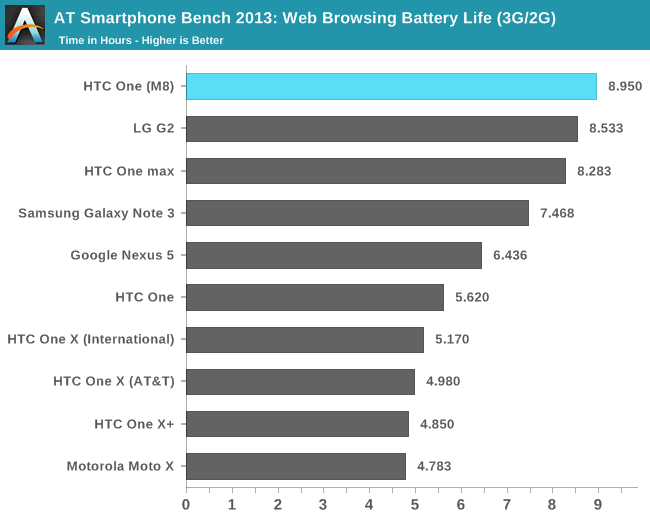
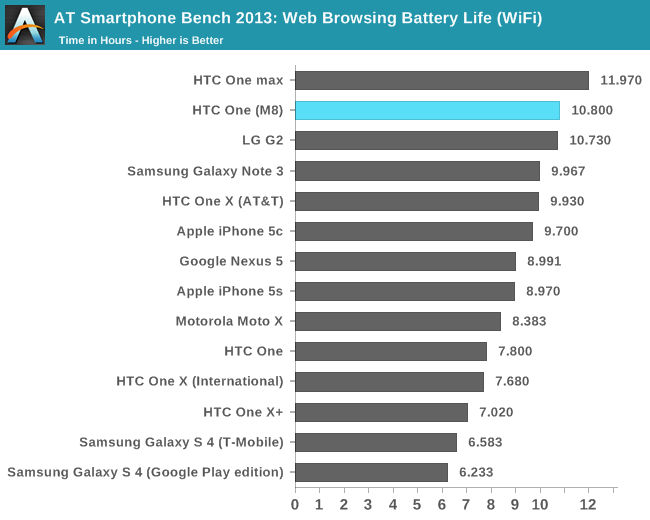
We saw a substantial gain in battery life with Snapdragon 800, and 801 extends that even further. For the same, relatively light (yet constant) workload, the M8 improves battery life over the M7 by as much as 71%. On WiFi the advantage drops to only 38%, but we’re still talking about absolutely huge generational gains.
A constant workload is only one part of the story though. More often than not, when you’re faced with faster compute you end up doing more. To see what the other extreme of battery life looks like I turned to two canned tests: BaseMark OS II and GFXBench 3.0.
I ran both of these tests under the same controlled conditions we always use, with all displays calibrated to 200 nits. BaseMark OS II runs through a bunch of CPU and storage benchmarks (basically the same tests used for the BaseMark OS II system and memory tests), as fast as possible, until the battery dies.
I like this benchmark as it gives us an indication of worst case battery life if you’re absolutely hammering the CPU (and storage) relentlessly.
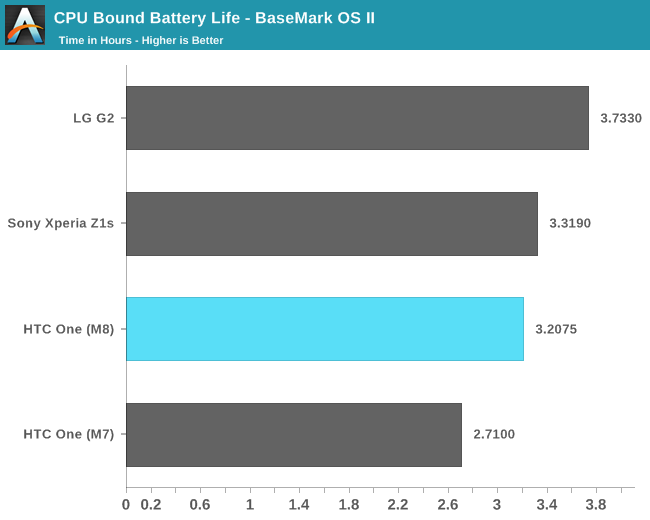
Despite the faster CPU cores, the M8’s battery life actually goes up compared to M7. Here we’re really seeing the benefits of 801’s updated 28nm HPm process compared to the Snapdragon 600’s 28nm LP process.
GFXBench provides a similar test, with effectively uncapped performance (on today’s devices at least since we’re not hitting v-sync limits), but stressing the GPU instead of the CPU. Here we’re running the T-Rex HD benchmark, onscreen, until the battery dies.
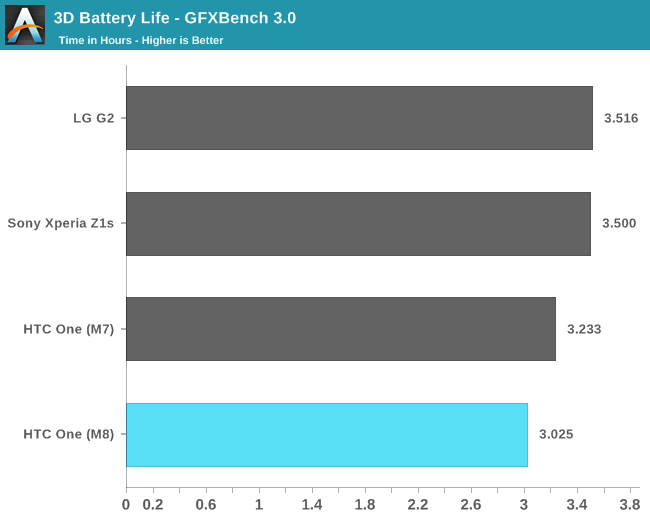
This is the first and only test we’ve got here that shows a regression in battery life compared to M7. The M8 loses about 6% of runtime compared to the M7, despite having a larger battery. Now look at what happens if we look at performance at the end of the run:
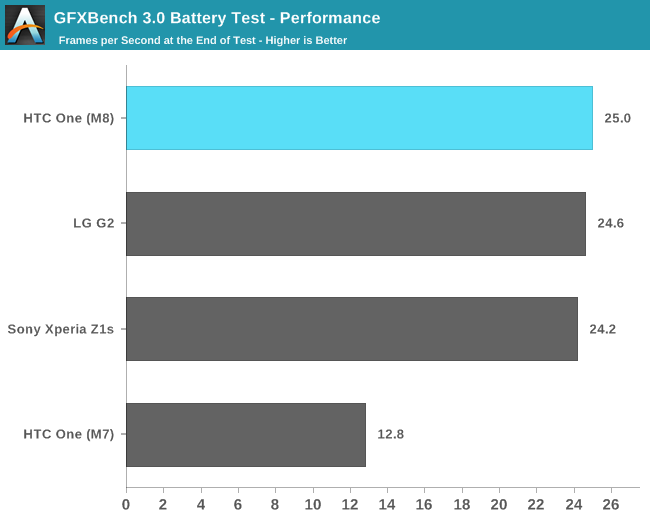
Now the M8’s battery life regression doesn’t look so bad. You give up 6% of runtime but you get almost twice the performance compared to M7. Snapdragon 801 is just a huge upgrade compared to 600.
Charge Time
The M8 features a Qualcomm Quick Charge 2.0 enabled PMIC, which enables faster battery charge times through higher voltage charging. Unfortunately the in-box wall adapter is only Quick Charge 1.5 compliant so you'll only pull 7.5W from the wall. HTC expects to offer a Quick Charge 2.0 compliant power adapter later this year.
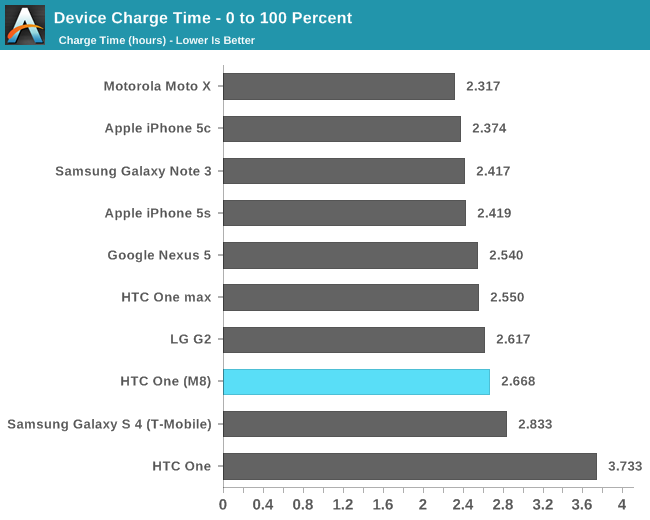
The M8's charge time is a bit slow compared to what we've seen from other devices with larger batteries.










222 Comments
View All Comments
fokka - Wednesday, March 26, 2014 - link
same here. i had hoped they keep it the same size and the bigger screen will be compensated by the on screen buttons. but seeing this huge black bar with the htc logo under the screen just about puts me off considering the new one is almost 1cm taller than the old.the problem is now that the m8 is here i would also feel dumb for buying an m7, the battery and sd slot alone are big selling points for me. but man is this thing big...
madwolfa - Wednesday, March 26, 2014 - link
Remaining happy camper with my M7.. M8 is not a worthy upgrade for me.. Guess shoulda wait for M9. I have another year of contract anyway.hangfirew8 - Wednesday, March 26, 2014 - link
My feelings as well, the M8 is a good fast phone, but I'm happy with my fast-enough M7. I still wish for a better still camera but the video is indeed good and it looks like we'll have to wait for the M9 to get the 6-8MP we need to make UltraPixel both sensitive and detailed.puremind - Saturday, March 29, 2014 - link
Take the new HTC One Mini. It will probably fit thebillhangfirew8 - Saturday, March 29, 2014 - link
Considering how much less the original Mini was compared to the M7, I doubt the new Mini will be better than my M7- which would make it better than the One M8.UltraWide - Wednesday, March 26, 2014 - link
HTC needs to make sure to follow up with prompt Android updates and not drop support for phones like the ONE X+, etc.At the end of the day, I will probably check out the HTC One M8, praise it for all the great points highlighted in this article and just buy the Galaxy S5 because it makes less sacrifices in the name of design.
tipoo - Wednesday, March 26, 2014 - link
They did really well with 2013 One updates, I don't know as much about the One X but I think that got pretty good update speeds too.sigmatau - Wednesday, March 26, 2014 - link
"HTC clearly saw design where others were more focused on cost optimization."Not sure if that matters when "cost optimization" is not passed on to the customer. When they came out, the Galaxy S4 cost more than the HTC One.
Death666Angel - Friday, March 28, 2014 - link
That's almost solely a function of hype/demand. After the great success of the Galaxy S2, Samsung had its bed made and simply needed to offer the new phone with everything a bit improved. Because of HTCs horrible marketing and naming scheme, they didn't have the same level of branding, so their new releases aren't nearly as covered, hyped and sought after.But as I said in my own comment, now the HTC M7 is the priciest of the former flagship phones, coming in at 410€ for the 32GB version, with the other brands bein 300 to 330€ for their 16GB versions. If you compare like to like, it is a bit closer.
hangfirew8 - Saturday, March 29, 2014 - link
Savings from the cost optimization goes into Marketing.